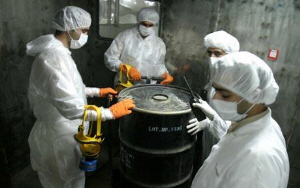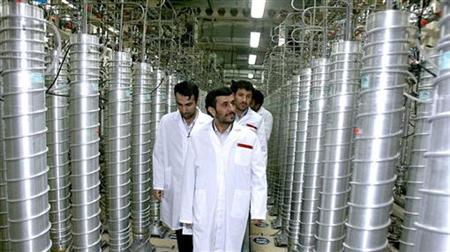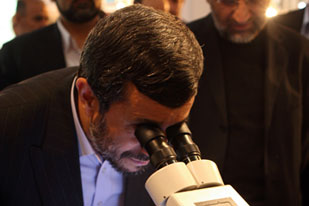Iranian President Mahmoud Ahmadinejad led a ceremony inserting Iran’s first domestically produced nuclear fuel into research reactor

Iranian President Mahmoud Ahmadinejad led a ceremony on Wednesday inserting Iran's first domestically produced, 20-percent enriched nuclear fuel into Tehran's research reactor.
Ahmadinejad was accompanied by Atomic Energy Organisation head Fereydoon Abassi Davani and other officials watching the procedure which is a technical achievement for the Islamic republic that had mastered all aspects of the nuclear fuel cycle.
Iran’s state television said Tehran has developed 4th generation centrifuges made of carbon fibre that are “speedier, produce less waste and occupy less space as they spin at supersonic speeds to purify uranium.”
20-percent fuel plates had been also created for a research reactor in Tehran whose stock of fuel sourced from Argentina in the 1990s is running low, the report said. The television also said that Iran had made progress in 20 percent uranium enrichment at its Natanz facility, beyond enrichment activities already underway there.
 This comes as western sanctions are sweeping through Iran which has called in six European ambassadors on Wednesday to discuss EU sanctions against Tehran, particularly moves to ban Iranian oil imports, Iranian media and some of the embassies said.
This comes as western sanctions are sweeping through Iran which has called in six European ambassadors on Wednesday to discuss EU sanctions against Tehran, particularly moves to ban Iranian oil imports, Iranian media and some of the embassies said.
The ambassadors of France, Italy, Spain, the Netherlands, Greece and Portugal were "invited" to speak separately with Hassan Tajik, head of the ministry's Western Europe department, the official IRNA news agency reported.
French, Italian and Spanish diplomats had already held their meeting with Tajik, according to IRNA news agency.
One of the embassies said the discussion focused on the European Union's January 16 announcement of a progressive ban on Iranian oil. The Iranian official expressed concern that the ban could hurt fragile EU economies, a diplomat said.
